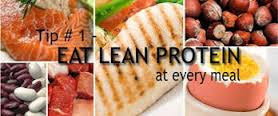Quality Protein
Quality matters!
Ever heard of the thermogenic effect of food? It's the result of your body expending energy, i.e. burning calories, to digest food. At the bottom of the hierarchy is processed foods that require very little energy to digest and at the top of the hierarchy is lean protein, requiring up to 30% of the calories consumed for digestion. What does that mean to you? Eat a 3 ounce chicken breast that is approximately 150 calories and your body will burn 45 calories just digesting it so your net calorie consumption is only 105 calories. Eating the equivalent in calories of Cheetos would result in a net calorie consumption of approximately 145 due to the food being so processed and requiring very little energy for the digestion process because there's little nutrition to actually extract.
So the actual definition of lean protein according to the USDA is lean meat having less than 10 grams of total fat, 4.5 grams or less of saturated fat, and fewer than 95 milligrams of cholesterol in a 3.5-ounce portion. Lean protein is primarily found in meat, poultry, fish, and eggs, but is also found in dairy and to some degree in vegetable and grain sources.
Some examples of lean protein are:
Ever heard of the thermogenic effect of food? It's the result of your body expending energy, i.e. burning calories, to digest food. At the bottom of the hierarchy is processed foods that require very little energy to digest and at the top of the hierarchy is lean protein, requiring up to 30% of the calories consumed for digestion. What does that mean to you? Eat a 3 ounce chicken breast that is approximately 150 calories and your body will burn 45 calories just digesting it so your net calorie consumption is only 105 calories. Eating the equivalent in calories of Cheetos would result in a net calorie consumption of approximately 145 due to the food being so processed and requiring very little energy for the digestion process because there's little nutrition to actually extract.
So the actual definition of lean protein according to the USDA is lean meat having less than 10 grams of total fat, 4.5 grams or less of saturated fat, and fewer than 95 milligrams of cholesterol in a 3.5-ounce portion. Lean protein is primarily found in meat, poultry, fish, and eggs, but is also found in dairy and to some degree in vegetable and grain sources.
Some examples of lean protein are:
- Chicken (white meat, skinless)
- Turkey (white meat)
- Fish (fresh Cod, salmon, tilapia)
- Certain cuts of red meat (sirloin, flank steak, lean ground beef)
- Bison
- Low fat dairy (non-fat Greek yogurt)
- Quinoa
- Beans
- Legumes
- All natural nut butter
- Oatmeal (not instant)
- Eggs
- Hummus
- Canned Tuna (Starkist makes very low and low sodium)
- Chickpeas
- Almond Milk, Rice Milk
- Tofu
- Raw nuts (unsalted)
- Tempeh
- Chia, Hemp seeds
Options are endless when it comes to they different types of recipes you can make using these protein sources. Try adding some of these lean proteins to your diet!


.png)



Comments
Post a Comment